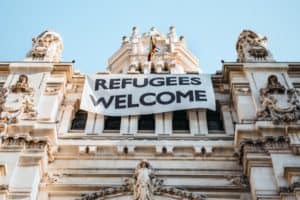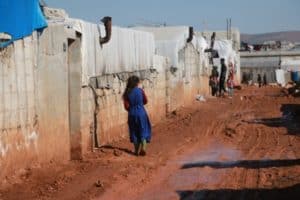This page contains affiliate links. This means if you a follow a link and make a purchase, at no additional cost to you, Humanitarian Careers will receive a commission. Thank you for supporting the site.
Each year, hundreds of billions of dollars are spent on humanitarian aid. With around 235 million people in need of humanitarian assistance, huge sums of money are definitely needed. Although charity contributions by individuals and philanthropy by private companies are important, a significant portion of aid spending comes from large donor organisations.
We’ve put together a list of some of the most important donor agencies providing funding for humanitarian responses around the world.
Foreign and Commonwealth Development Office
The Foreign, Commonwealth and Development Office (FCDO) is the main humanitarian donor of the UK government. The FCDO covers all aspects of UK government relations overseas, including managing donor grants for humanitarian assistance projects. NGOs looking to secure funding from the UK government for their humanitarian responses must apply to the FCDO.
The FCDO provides donor grants directly to humanitarian NGOs to run rapid responses and long-term development projects. It’s main areas of focus for its humanitarian grants include education, health, WaSH, protection, and environmental and climate action.
The FCDO is one of the most important humanitarian donor agencies in the world. They provide funding to major NGOs including Save the Children, Oxfam, the British Red Cross, SightSavers and the International Rescue Committee. The FCDO is a donor to many NGOs globally and does not exclusively provide grants to UK humanitarian agencies.
The humanitarian donor arm of the FCDO was formally known as the Department for International Development (DFID). For many years this was a standalone UK government department providing funding to humanitarian NGOs. Since June 2020, DFID was merged with the Foreign and Commonwealth Office to create the FCDO. They still provide a range of humanitarian expertise and huge amounts of funding to crises responses and development projects around the world.
USAID
USAID, officially called the United States Agency for International Development, is the largest department within the US government providing humanitarian funding. USAID is a major donor for humanitarian responses globally. With a total budget of around 27 billion dollars, USAID is also the biggest single donor of humanitarian action in the world.
Funding provided by USAID covers a range of humanitarian issues. As a donor, USAID has a particular focus on health, women and girls’ rights, disaster and crises response, global security, and humanitarian innovation. Other key areas of humanitarian assistance that USAID provides donor funding for are education, water and sanitation and climate action.
Founded in 1961, USAID now works in more than one hundred countries. USAID has a huge array of projects covering both first-phase humanitarian emergency response and long-term development interventions.
Major humanitarian NGOs that have USAID as their donors include Mercy Corps, International Medical Corps, International Rescue Committee, Catholic Relief Services, Save the Children, World Vision and CARE International. USAID provides a range of humanitarian funding and it is possible to have USAID as a donor for a humanitarian project even for an NGO based outside of the US.
German Federal Foreign Office
The German Federal Foreign Office includes Germany’s international humanitarian donor agency, known as GFFO. As one of the major donors funding aid projects around the world, GFFO is renowned for supporting a range of humanitarian projects. Acting as a donor for UN agencies, the Red Cross Movement, and international NGOs, GFFO is one of the most important funders of humanitarian responses.
GFFO provides money for a range of humanitarian interventions through partner organisations. Its strategic focus includes protection, forced displacement, humanitarian preparedness, cash transfer programming and WaSH. GFFO also have a focus on humanitarian assistance in health, nutrition and food security and mine action.
Many important humanitarian organisations have GFFO as their donor. These include Médecins du Monde, Plan International, INSO, the World Food Programme, and Save the Children.
As a donor, GFFO provides significant funding to humanitarian crises around the world. A large portion of its projects are focused in the Middle East – nearly two thirds. However, GFFO is the donor for humanitarian projects Africa, Asia, Europe, and Latin America. GFFO funds humanitarian projects from NGOs based all over the world.
ECHO
The Directorate-General for European Civil Protection and Humanitarian Aid Operations is the department coordinating humanitarian funding for the EU. Known as ECHO, it is the most important aid funding agency of the European Union for humanitarian crises responses. Founded in 1992, ECHO currently has a budget of around 9.76 billion Euros.
ECHO provides donor grants to over 200 humanitarian NGOs around the world. It also gives funding to UN agencies and the Red Cross Movement. It has offices in over 40 countries and prides itself as being a humanitarian donor with an extensive field presence.
As a humanitarian donor, ECHO funds a huge range of humanitarian interventions. These include projects in health, nutrition, protection, gender-based violence, education in emergencies, shelter, WaSH, food assistance and cash transfers, just to name a few.
ECHO is one of the most important donors in the humanitarian sector. They provide funds to some of the leading humanitarian NGOs including Save the Children, Danish Refugee Council, Norwegian Refugee Council, Médecins du Monde and the International Rescue Committee. They are also a donor for the International Committee of the Red Cross/Red Crescent.
Bill and Melinda Gates Foundation
The Bill and Melinda Gates Foundation is the philanthropic organisation set-up by the Microsoft founder and his wife. The Foundation is a significant donor to humanitarian and development projects. Donating large sums of money to humanitarian emergency responses, the Bill and Melinda Gates Foundation state their aim is to:
‘’reduce suffering and save lives in regions affected by natural disasters, disease outbreaks, and complex emergencies.’’
As a humanitarian donor, the Bill and Melinda Gates Foundation has three main pillars to their strategy. These are emergency humanitarian relief, capacity building of humanitarian responders and learning and innovation. In 2019, the Foundation provided around 4.1 billion dollars in humanitarian and development funding.
As a major donor in the humanitarian sector, the Bill and Melinda Gates Foundation provides funding to both rapid onset emergency responses, such as earthquakes, typhoons, and flooding, as well as to slow-onset and complex crises. The Foundation has funded responses to famines, droughts, and pandemic diseases, including Ebola and Covid-19.
Many leading humanitarian NGOs and UN agencies have received donor funds from the Bill and Melinda Gates Foundation. These include the World Health Organisation, UNICEF, Save the Children, and CARE International.
UN High Commissioner for Refugees
UNHCR is the UN’s refugee agency. As well as running programmes around the world assisting people who have been forced to flee their homes, UNHCR is also a major donor to humanitarian NGOs. It was founded in 1950 and with a total budget of around 8.6 billion dollars. For humanitarian agencies working in the area of human displacement and migration, UNHCR is a crucial donor.
As one of the most important organisations working with refugees in the world, UNHCR plays a vital role in funding work to assist displaced people. With a presence in more than 134 countries, UNHCR is also one of the largest donors to humanitarian relief projects. UNHCR is the donor to many large international NGOs as well as local groups working directly with refugees.
Some of the most well-known humanitarian agencies who have UNHCR as their donor include the Danish Refugee Council, Norwegian Refugee Council, and the International Rescue Committee.
As a humanitarian donor, UNHCR funds a range of projects aimed at directly assisting displaced people. Their areas of focus include shelter provision, protection, education, public health, cash transfers, and livelihoods. For most projects, UNHCR funds partner organisations to implement.
UNICEF
UNICEF is the UN’s children’s agency. Founded in 1946, UNICEF is one of the oldest, and most important, humanitarian donors for projects helping children. Each year, millions of children around the world are affected by disasters, conflicts and crises and UNICEF is one of the main donors who responds. UNICEF often partners with local and international NGOs to implement their projects.
With representation in 192 countries, UNCIEF is one of the most recognisable humanitarian donors in the world. UNICEF funded projects focus on child centred humanitarian interventions. Their projects include child protection and inclusion, childhood nutrition, health, and WasH, they also fund programmes for children focusing on education, gender, and HIV.
Many famous humanitarian NGOs have UNICEF as their donor. These include Save the Children, Terre de Hommes, Oak Foundation, Global Alliance for Improved Nutrition and the World Alliance for Breastfeeding Action.
UNICEF acts as a donor to many other UN agencies for humanitarian projects assisting children. They also focus heavily on advocacy, providing grants to organisations to campaign on behalf of children affected by poverty and crises around the world.
Unilever Foundation
The Unilever Foundation is the philanthropic arm of the consumer-products giant. Unilever states that the Foundation’s is:
‘’dedicated to improving the quality of life through the provision of hygiene, sanitation, access to clean drinking water, basic nutrition, and enhancing self-esteem.’’
Unilever has for long time been a major humanitarian aid donor. With partnerships with humanitarian organisations including Save the Children, Oxfam, World Food Programme, and UNICEF, the Unilever Foundation is one of the largest corporate donors in the aid sector.
The Unilever Foundation funds a range of humanitarian interventions around the world. Their humanitarian programs focus especially on childhood nutrition, health, livelihoods, and food security.
As a humanitarian aid donor, the Unilever Foundation provides a mixture of emergency and crises funding, as well as longer-term development funding. The Foundation also has a focus on humanitarian innervation and learning.
Humanitarian Funding Online Courses
If you want to learn more about how humanitarian aid projects are funded, and what skills are needed to attract donors to your NGOs work, take the online short course How To Design & Fund International Development NGO Projects. We think it’s one of the best overviews of how humanitarian organisations can better design projects that donors will fund. Click the like to enrol on the course.
Writing effective proposals that donors will fund is key to any humanitarian organisations success. Almost all staff in a humanitarian agency will feed into proposals and all need to know how to write quality inputs. We think the online course Grant Writing: Keys to a Successful Proposal is a must for anyone working in the humanitarian sector. Follow the link for more course information.
Another great online course for those interested in how to secure funding for their humanitarian organisation is How to Kickstart Your NGO. This course covers all aspects NGOs need to develop quality projects and attract funding from humanitarian donors. The link is to the course’s page.
Global Affairs Canada
Global Affairs Canada, known as GAC, is the leading Canadian government donor for humanitarian action. GAC is the donor to many established humanitarian NGOs that respond to crises and disasters around the world.
As the most important humanitarian donor in Canada, CAG provides a range of funding to humanitarian projects. CAG has many funding pools which include the Central Emergency Response Fund, Emergency Disaster Assistance Fund, the Canadian Food Grains Bank Food Assistance Fund and Canadian Humanitarian Assistance Fund. Each area of funding is related to specific area of humanitarian intervention and GACs core strategy.
Global Affairs Canada is the donor for many humanitarian NGOs and UN agencies. Aid NGOs supported by GAC include the Norwegian Refugee Council, Save the Children, Médecins du Monde, and CARE International. UN agencies GAC is a donor for include UNICEF, UN Women, and the World Food Programme.
As a humanitarian donor, GAC funds a range of strategic aid interventions. Some of the areas it funds include food security and nutrition, water sanitation and hygiene, emergency healthcare and shelter. The Canadian government assigns around 6.2 billion dollars in humanitarian assistance, a significant portion of which is provided to GAC to act as a donor agency.
French Crisis Centre
The Crises Centre of the French government is known as the CDC. It is the one of the donor agencies ran by the government of France. It has a focus on emergency and rapid-onset humanitarian crises. Founded in 2008, the CDC was established to respond to developments in the global humanitarian context and the need for a rapid reaction donor to meet emerging needs.
The CDC is the main department of the French Ministry of Foreign Affairs providing donor grants to NGOs to undertake emergency humanitarian responses. The broader mandate of the CDC is to respond to crises around the world as well as monitor and analyse developing humanitarian issues. It provides a range of donor grants, mostly but not exclusively to French humanitarian aid NGOs.
As an emergency donor, the CDC funds a range of rapid humanitarian interventions. Aid NGOs funded by the CDC include Médecins du Monde, ACTED and Action Contre la Faim.
The French Crises Centre focuses on four core areas of emergency humanitarian response. These are crises anticipation, preparedness, monitoring and after crises stabilization. The CDC is mainly a donor for humanitarian emergencies that require rapid reaction.
Swedish International Development Cooperation Agency
The Swedish International Development Cooperation Agency, known as SIDA, is the Swedish governments humanitarian donor agency. SIDA provides funding to humanitarian NGOs and UN agencies, as well as leading research into humanitarian affairs and supporting civil society groups.
As one of the most important humanitarian donors in Europe, SIDA leads on providing a range of funding grants for humanitarian responses. Strategic areas of humanitarian work that SIDA funds include education, gender equality, health, water sanitation and hygiene, migration and human displacement, and peace building.
SIDA is funded by the Swedish government. SIDA provides a range of humanitarian grants including for rapid-onset humanitarian emergencies, chronic and complex crises, and long-term development interventions. SIDA is also a donor for a range of environmental and climate action projects, including on the relation between climate change and humanitarian crises.
As Sweden’s leading humanitarian donor agency, SIDA provides millions of dollars in funding each year. Major NGOs with SIDA as a donor include Save the Children, Action Against Hunger, International Rescue Committee, Islamic Relief, Norwegian Refugee Council, Oxfam GB and Plan International Sweden.
UN Women
UN Women is the United Nations agency working for gender empowerment. As a humanitarian donor, UN Women funds a projects aimed at assisting women and girls affected by crises, fighting gender-based violence and campaigning for women’s rights. Most UN Women projects are implemented by local and international humanitarian NGOs through grants it provides.
Providing funds to a huge range of projects, UN Women is one of the most important humanitarian donors for women empowerment work. With a presence across Asia, Africa, the Middle East, Europe and Latin American and the Caribbean, UN Women is a truly global aid donor.
UN Women provides donor funding to different types of humanitarian projects. These include programmes on women’s leadership and participation, youth, women and girls with disabilities, HIV/AIDs, disaster rick reduction, and emergency relief.
With a total budget of around 510 million dollars, UN Women is one of the largest humanitarian donors working on gender issues. UN Women is a donor to several international NGOs as well as other UN agencies.
If you want to know more about how humanitarian projects are funded, and which donors to apply to, explore our list of the top humanitarian aid online courses here.





